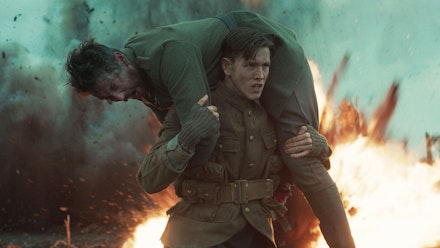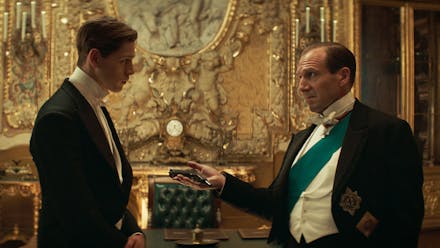A prequel is generally the lazy option for the third part in a franchise, cobbling together a story of where it all began rather than opting for the more complex task of deciding where it goes next. But Matthew Vaughn’s Kingsman origin story certainly can’t be accused of being lazy. It’s imaginative to a fault, crammed with countless ideas — some inspired, some underworked, and quite a few that should have been binned.
It makes sense for the Kingsman series, about a group of stiff-upper-lipped secret agents, to have its origins in a time when upper lips were at their stiffest: the 1910s, in the lead-up to World War I. Orlando, Duke of Oxford (Ralph Fiennes), is a war hero who can no longer stomach war. He and his wife Emily (Alexandra Maria Lara) are dedicated to helping victims of conflict. When Emily is killed in crossfire in a visit to a British concentration camp in South Africa during the Boer War, Oxford’s pacifist stance is cemented. He vows his son will never be harmed fighting someone else’s battles. This does not sit well with said son, Conrad (Harris Dickinson), especially when World War I dawns and he’s forbidden from doing what he considers his duty to his country. His father tries to show him there is another way to do your duty: by preventing war from happening.

Now, from here it all gets rather bonkers. The War, you see, is not merely down to world leaders craving power. It’s actually the masterplan of a shadowy, SPECTRE-like organisation, headed by a very angry, unseen Scottish man, like Blofeld written by Irvine Welsh, who really, really hates the English and employs some of history’s most baroque villains — Rasputin, Mata Hari, Lenin — to help him bring down his enemy. (Stay with us, we’re nearly there.) Oxford has his own secret mini gang: his manservant, Shola (Djimon Hounsou), and Polly (Gemma Arterton), a gun-toting housekeeper who’s Mary Poppins meets Wyatt Earp. They’re trusted by England’s highest powers to secretly stop the Scotsman’s plan succeeding.
The combo of larky spy-romp, father-son drama, and revisionist history is too much for Vaughn to balance and the film struggles to find a consistent tone.
There are lots of clever, fun thoughts at play here. The way Vaughn connects figures from history with his fictional heroes works, albeit in a complicated way. It takes a huge amount of explanation, which means the first hour involves many scenes of men in rooms clarifying things. Once it gets to the actual war-foiling, there are tremendously enjoyable scenes, none more so than a mission to dispatch Rasputin, who is controlling the Russian Tsar. As played, to the hilt, by Rhys Ifans, Rasputin is a hard-drinking, sword-fighting, thigh-licking, improbable-accent-having riot. This section has an inventive, camp energy that’s absent from much of the rest of the movie. The combo of larky spy-romp, father-son drama, and revisionist history is too much for Vaughn to balance and the film struggles to find a consistent tone. It also must be said that while Vaughn’s real-world angle is sort of ingenious, there’s something profoundly distasteful about rewriting World War I into a comedy squabble, particularly as he reaches for poignant drama with his scenes on the actual battlefield. It adds a sour taste that’s hard to ignore, especially in a misjudged coda.
Casting across the board is inspired, even when the actors are underused. Hounsou and Arterton are given no life beyond serving their employer, but they work hard to rustle up some personality. Dickinson does well with a rather earnest role, not gifted the humour that gave Taron Egerton a star-making opportunity in the first film. It’s an interesting choice to cast Fiennes as an action star. A man who always looks like he knows something you don’t, Fiennes is fully believable as somebody who could think his way out of any situation. The action — at one point Fiennes plummets from a plane, climbs a mountain, has a brief fight with a goat, then charges straight into a lengthy shootout, all without pausing for a breather — is well done, but not needed. Fiennes shows earlier in the film he can entertainingly outfox a villain by doing nothing more strenuous than taking his trousers off.
It’s a much better film than The Golden Circle, and the glut of ideas means a fun moment is never far away, but if Vaughn wanted to go back in time, it’s a shame he didn’t go back to the cleaner plotting and lighter tone of the first film.








